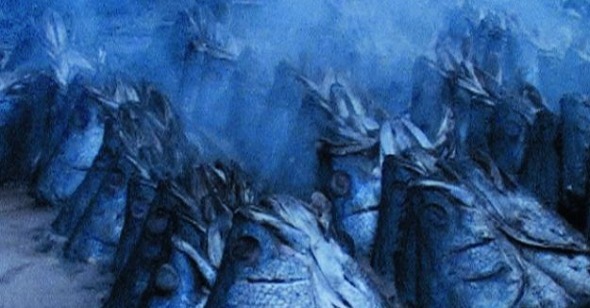Crisis Management
by Andrew Tracy
Darwin's Nightmare
Dir. Hubert Sauper, Austria/Belgium/France, International Film Circuit
Considering that politics and aesthetics are inseparable, it’s curious how difficult it can be to not read the one as an inherent reduction of the other rather than a potential expansion. When faced with a film that brings that relation directly to the forefront, many will, perhaps inevitably, tend to lump it in a single camp, its identification as the one serving as an opening to predictably mild castigation for its failure to engage the other. It’s precisely this kind of categorization that ghettoizes the discussions that can be had about these films: rather than exploring how the film’s aesthetic being articulates and transforms the political truths or falsehoods it puts forth, each side is regarded as a self-contained end unto itself, a mold simply waiting to be filled with the required material.
I can’t recall a review of Hubert Sauper’s Darwin’s Nightmare that didn’t read like a shopping list of atrocities: the genetically engineered Nile Perch which has destroyed the ecosystem of Tanzania’s Lake Victoria even as it is relentlessly harvested to stuff the gullets of Europeans; the impoverished community surrounding the lake, ruthlessly exploited by their de facto absentee European landlords, devastated by AIDS, scouring the yards of rotting refuse for food, wracked by random violence, losing their children to pathetic, glue-sniffing escape; and the final, damning revelation that the planes which fly out with African fish fly in with European weapons, fuelling the wars which have ripped the continent apart. Horrible, horrible!. . . but a little strident, don’t you think? These polemics, you know, not much for subtlety. . .
No indeed, and bless Sauper for it. Why import aestheticism onto a situation whose horrifying urgency provides the aesthetic by way of its own being? With, of course, the aid of Sauper’s virulent, tragic, unforgiving eye. Jonathan Rosenbaum once noted that he saw no contradiction in finding Claude Lanzmann’s magisterial Shoah entertaining; just so, Sauper’s Darwin’s Nightmare, muddy DV cinematography and all, is perhaps the most beautiful film I saw last year. Beautiful not in spite of its horror and urgency, but because of it, because it recognizes that the true weight of that horror and urgency rests on the atrociously calm, contemplative pace at which it occurs. Darwin’s Nightmare is not after shock, but sadness—the sadness bred from the moment when the eminently changeable has descended upon human life as the inevitable.
Sauper’s anger at what he sees, and his clear identification of those who are responsible for it, is tied in to his enormous respect for those who suffer under it: for their tragic complicity in the conditions which beset them no less than their endurance of them. When the local priest calmly and lucidly explains the ravages of AIDS throughout his parish and then calmly and lucidly explains his refusal to advocate contraception (“This is a great sin”); or a night watchman at a chemical company, armed with a bow and arrow (to avoid the fate of his predecessor, murdered as the company neglects to supply them with arms), notes that he would welcome another war for the food and wages it would provide; or one of the drunken and whoring Russian pilots, no less trapped in indentured servitude to the multinationals than the oppressed locals, finally confesses to the open secret contained in his plane’s cargo hold, Sauper is not merely racking up points against a single adversary.
The horror of the situation is evident; the reasons for its being so are clear; the need for its correction is immediate. And set against this immediacy is the sheer duration of human existence, even under conditions that will cut it decisively short: the length and slowness of life which can breed both passivity in the face of suffering and a tremendous, inexplicable fortitude. A fortitude bereft, it is true, of the moral being we might wish to assign to it  perhaps, at its core, no more than the mute imperative of survival  but whatever it is, it is something genuine and irreducible. Sauper shows us a nightmare, but not a Hell: the remorseless logic of eternal oppression is subordinated too often to the surprises and beauties of human(s) being. The sad and lovely quietude with which Sauper captures the timelessness of that being only makes the need to alleviate its burdens the more pressing.
